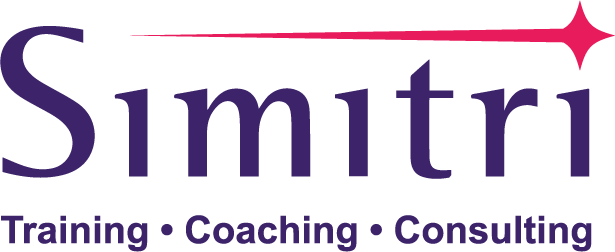EACH YEAR, SIMITRI compiles a list of the most requested topics and themes based on conversations with our clients about the upcoming year.
Here are the five trends to watch:
1. THE SHIFT TO INSTRUCTOR-LED WEBINARS
2019 saw a significant increase in webinar delivery and we expect to see the trend continue throughout the coming years. Companies are moving their entire curriculum to virtual delivery, and not just for remote locations. This trend reinforces the strive for shorter and more flexible training duration.
BENEFITS OF VIRTUAL LEARNING
Available to remote teams / smaller geographies
No travel expense for participants or facilitator
No need for large meeting rooms
Short timeframe to sign on prior to training commencement
Scalable programmes for larger groups and multiple locales
Media-rich experience and interactive tools
Visual content in real time
Robust registration and reporting capabilities
2. THE FUTURE LEADERSHIP
UPSKILLING LEADERS
The investment in training for leaders and managers is set to rise as the definition of ‘leader’ is broadening. A majority of large organisations now consider individuals to be leaders based on their impact, not on their authority or position. Increasingly, a leader is viewed as “anyone, whether they manage others or not, who is a top-performer in their specific role.”
Companies have a renewed focus on leadership and management soft skills (coaching skills, mentoring, leading high performing teams), as they bring developing markets up to the same standard as their global hubs, especially as they work cross-culturally across global projects and with global clients.
Anticipate greater transparency on performance criteria, changes in corporate strategy, more flexible career opportunities, and the tighter high potential selection and management succession processes.
CUSTOMISED LEARNING JOURNEY
Research shows that a period of extended review and follow-up, with supplemental learning content, can improve knowledge retention and transfer of skills into the workplace.
Increasingly L&D teams are asking a central question: How do we turn this programme into a broader learning journey? Approaches include manager involvement, online tools, follow-up sessions, and coaching.
Learning journeys work best when they are multi-modular - with each module containing a workshop or webinar, embed learning, coaching sessions, burst learning and a tie-in to an action learning project that is directly related to the business.
3. COACHING CULTURE
More and more focus is expected on both individual coaching and team coaching. Simitri sees the trend in developing internal talent to have them future-leader ready. Understanding external trends affecting future talent, the need to have succession and improve performance also drives the selection of key talent and one way to drive personal growth is through external or internal executive coaching.
4. NEW TECHNOLOGIES
Companies are always on the lookout for new technologies to deliver learning. The risk is in knowing which new technologies will work. Several clients have shared stories about investing in an e-learning solution only to find low learner engagement and near-zero completion rates.
There is no silver bullet. Learning teams need to match each solution to the right situation, making sure it is relevant to the learning process and not simply a gimmick.
Gamification is still high on the wish list; however, take-up has been hindered by the cost of entry and uncertainty about how well the participants will receive the game. For adults, gamification is less relevant for introducing content and developing skills, but rather for team building, following-up on past workshops and driving the “a-ha” moment. The best games need not be digital. After piloting online games, it is common to return to a reliable in-class experiential learning delivered by a skills facilitator. For adults, the true power is not in the game, but in the debrief.
Artificial Intelligence (AI) or Virtual Reality (VR) can help learning teams automate learning administration. Still, clients see this as more “on the horizon” as solutions need to be proven to deliver on desired promises.
USING VR TO EXTEND REACH
An Australian utility company is already using virtual reality to deliver technical skills training and safety orientation to their pole workers. Workers wear VR headsets and run a training programme which places them in a challenging on-site situation. This allows them to work through dangerous scenarios safely under the guidance of their supervisors.
New hires can now orient themselves to the pole experience and without the dangers of climbing a 60-foot pole. Experienced workers can join skills refresh training and orientations without the need to travel into a central training centre, or the need to send a supervisor/trainer out to what are often extremely remote locations. This gives VR a nice niche to fill, improving engagement while saving money.
5. DRIVING REVENUE
What is clear is that markets are ever more competitive, differentiation is becoming harder, and buyers are ever more sophisticated.
Simitri, in anticipating this challenge, is ready to support clients with a robust end-to-end solution, aimed at making sales teams more proactive than reactive.
MOVING FROM ‘FOCUSING ON OUR SALES PROCESS’ TO ‘UNDERSTANDING THEIR BUYING PATTERNS’
There are many buzz words in sales today, including the potentially arrogant Sales Challenger, UVP, Digitalization, Freemium, Quick Wins, Cutting-edge or Revolutionary.
Fewer and fewer organisations can create any real uniqueness in their product offering, and even if they can, it tends to be for a short time while the competition catches up.
So how can sales overcome this challenge and drive revenue growth in the ultra-competitive smaller and smaller world we live in?
The Simitri Sales Curriculum
Simitri will be introducing a new Sales Curriculum that focuses on three key stages salespeople need to go through to move from a traditional approach.
There are three defined stages;
Building the Pipeline
Winning the Business
Deepening Client Relationships
Within each stage, there are three offerings. Simitri can support clients through the entire curriculum, or at individual stages.

